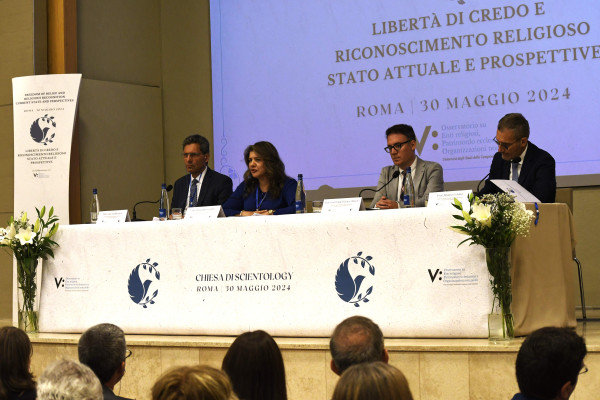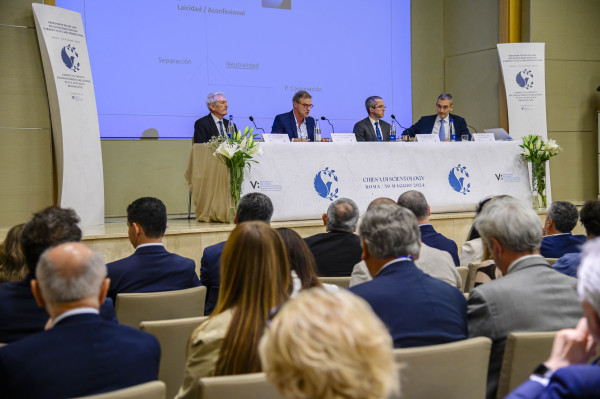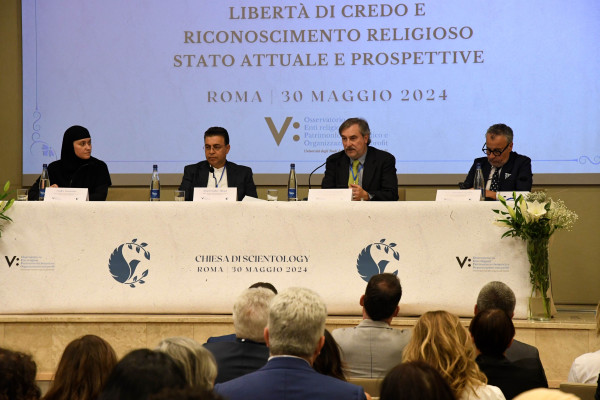University professors, government officials, parliamentarians and religious representatives participated in a day-long conference to discuss current challenges to religious freedom.
KingNewsWire // Brussels, Brussels, Belgium, June 3, 2024 – Thursday, May 30, the international conference on freedom of religion in Italy and in the world was held, entitled “Freedom of belief and religious recognition: current state and perspectives, » took place in the auditorium of the Church of Scientology in Rome. It was organized with the collaboration of the Observatory of Religious Entities, Ecclesiastical Heritage and non-profit organizations of the University of Campania “Luigi Vanvitelli”.

The conference consisted of two international round tables in the morning moderated by Professor Alfonso Celotto, professor of constitutional law at the University of Roma Tre, and two national ones moderated by Professor Antonio Fuccillo, professor of ecclesiastical and intercultural law at the University of Campania “Luigi Vanvitelli” .
International Examples of Religious Freedom
The first panel featured senator Lorena Ríos Cuéllar, former director of religious affairs for the Colombian government; Professor José Daniel Pelayo Olmedo, Deputy Director General for Coordination and Promotion of Religious Freedom of the Spanish Government; and Dr. Gary Vachicourasprofessor and academic affairs administrator at the Institute of Higher Studies in Orthodox Theology (Chambésy, Geneva).

This panel described the situation in Colombia, a secular but non-atheist state with a constitution that guarantees both individual and collective freedom of religion. It then covers that of Spain, where there are 26,000 religious groups registered in the Register of Religious Organizations. For Professor Vachicouras, of Greek origin, societies are increasingly confronted with religious plurality and the problems that result from it. The solution to conflicts, he said, is acceptance of the principle of freedom of belief. The panel showed how three countries with different traditions (Colombia, Spain and Greece) recognized their religious entities, notably Scientology, within a framework of great freedom and inclusion.
The second panel included an American lawyer and a constitutional expert. Austin Hepworth; Professor Juan Ferreiro Galguera, professor of ecclesiastical law at the University of Oviedo, Spain; and Professor Vincent Berger, former jurist at the European Court of Human Rights.

Attorney Hepworth explained how the principle of religious freedom is applied in the United States, also recalling the 1948 United States-Italy Treaty of Amity on automatic mutual recognition of entities, including religious ones. Professor Ferreiro Galguera explained the difference between the secular State which respects religious phenomena and cooperates with them, as is the case in Spain, and the secular State which, on the contrary, prevents them, as is the case in Spain. case in France.
Professor Berger asserted that state tolerance of a religious faith should not replace its full recognition and recalled the remedies offered by the ECHR against limitations on religious freedom, with the possibility of also have recourse to the Court of Strasbourg.
Analysis of the Italian situation of religious freedom
The speakers in the first section of this panel were Prof. Maria D’Arienzo, professor of ecclesiastical, canonical and confessional law at the “Federico II” University of Naples; Professor Gianfranco Macrì, professor of intercultural law at the University of Salerno; and Professor Francesco Sorvilloassociate professor of law and religions at the University of Campania “Luigi Vanvitelli”.

The particularity of the Italian normative situation has emerged, to the extent that the Constitution addresses religious freedom in 4 specific articles and in 5 with a more general approach, but a law on religious confessions is still missing, having to still refer to the Law No. 1159, which dates back to 1929, and which concerns the “admitted confessions” in the “Kingdom of Italy”, a law predating the republican democracy that is Italy today.
The second part of this panel featured the editor-in-chief of bitterwinter.org and journalist of the Journal of CESNUR, Dr. Marco Respinti; Dr Nader Akkad, advisor for religious affairs at the Grand Mosque of Rome; and Mother Anastasia, legal advisor to the Romanian Orthodox diocese.

Dr. Respinti explained how the media perceives religiosity and their own responsibility for how it is perceived in society. Dr Akkad highlighted the importance of dialogue between members of different faiths, while Mother Anastasia spoke about the difficulty for the Romanian Orthodox Church in working towards recognition in Italy for more than 13 years.
What emerged overall was the need to pay greater attention to the religious phenomenon for regulation accomplished not only at the level of individuals but also of organizations in their relations with States.
“Freedom of religion and respect for the beliefs of others have always been principles of fundamental importance to the Church of Scientology,” recalled Lina Pirotta, representative of the Church of Scientology Italy, in her speech at welcome conference participants.
The Creed of the Church of Scientology itself, written in 1954 by the religion’s founder, L. Ron Hubbard, states in part: “We of the Church believe that all men have inalienable rights to their own religious practices and their fulfillment.
It is within this framework that the Church of Scientology strongly supported this conference, collaborating with national and foreign experts to carry it out in order to provide a clearer picture of the state of freedom of belief in Italy and in other countries. other countries, as well as possible solutions. this could contribute to making this fundamental right a fulfilled reality, promoting its development.
Originally published in The European Times.
source link eu news













